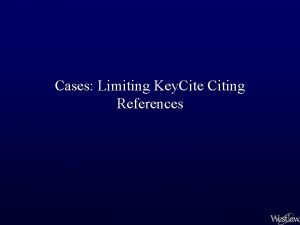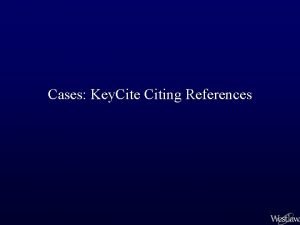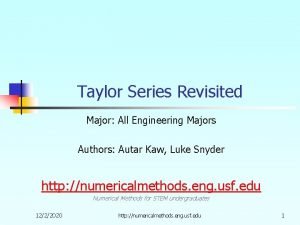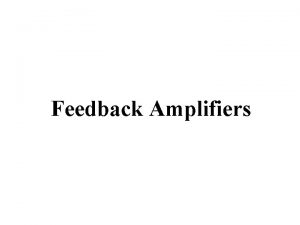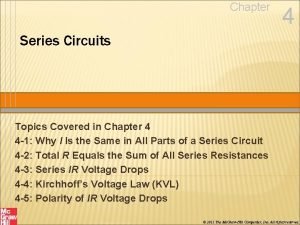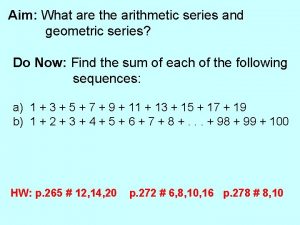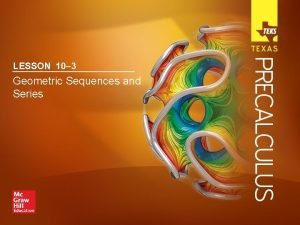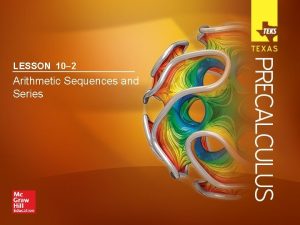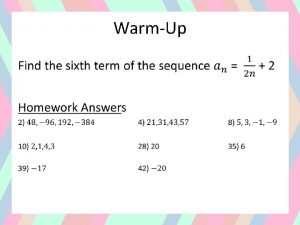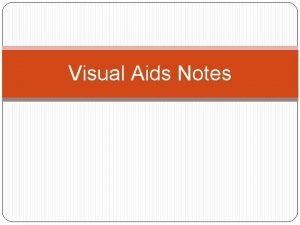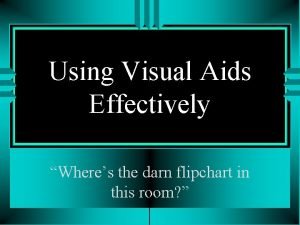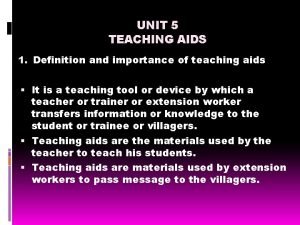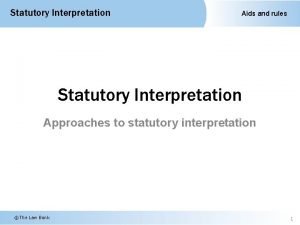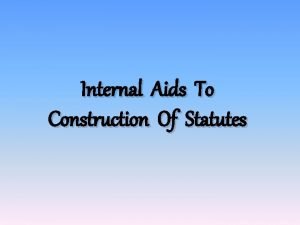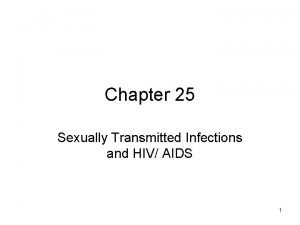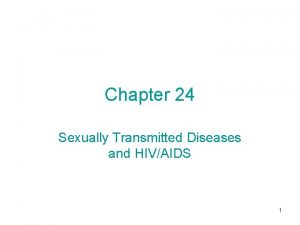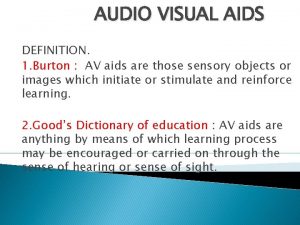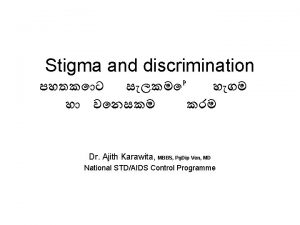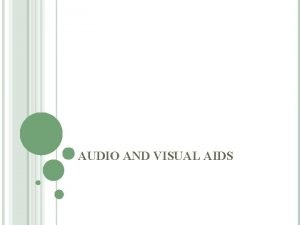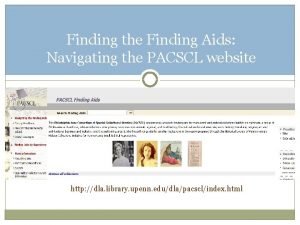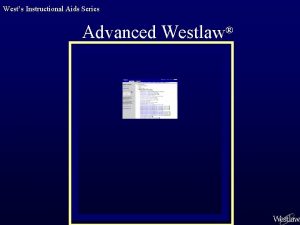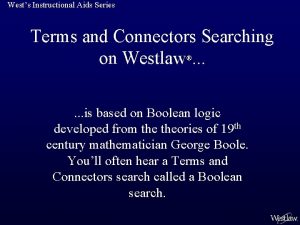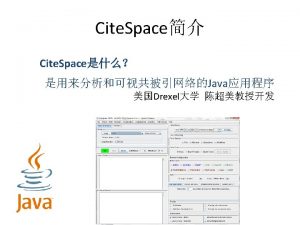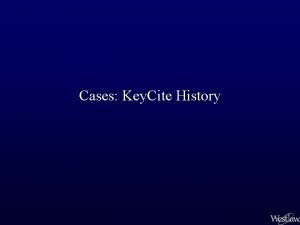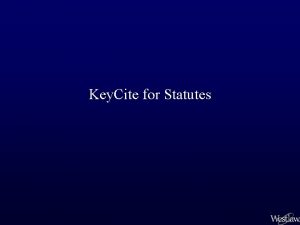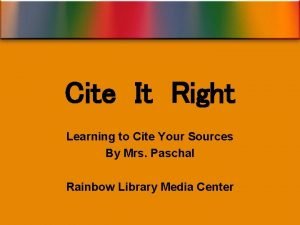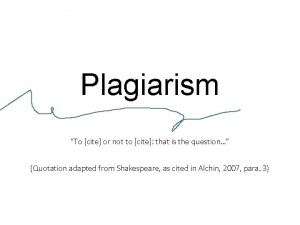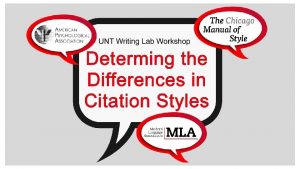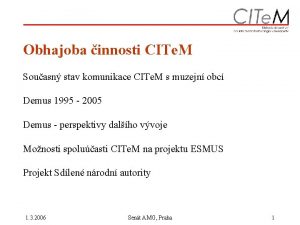Wests Instructional Aids Series Key Cite Wests Instructional








































































- Slides: 72

West’s Instructional Aids Series Key. Cite®

West’s Instructional Aids Series Contents • • Introduction Cases: Key. Cite History Cases: Key. Cite Citing References Limiting Key. Cite Citing References Key. Cite Notes : Expanding Your Research Table of Authorities Key. Cite for Statutes Key. Cite Alert

Introduction Back to Contents

Introduction Key. Cite is West’s citation research service available to you on Westlaw® • Key. Cite tells you whether a case, statute, federal regulation, or federal administrative decision is GOOD LAW. • Key. Cite provides links to other cases, administrative decisions, and secondary sources that mention or discuss the case, statute, federal regulation, or federal administrative decision.

Introduction Use Key. Cite to Be Sure It is critical in legal research to • Find the relevant cases, statutes, federal regulations, and federal administrative decisions to support your legal argument • Determine that a case, statute, federal regulation, or federal administrative decision is still good law and therefore can be used as the basis of your legal argument

Introduction Key. Cite for Cases A case can be • • • Reversed by a higher court Overruled at a later date Superseded by statute Criticized without being overruled Cited favorably by other courts, thereby strengthening its authority

Introduction Key. Cite for Statutes A statute can be • • • Repealed Amended Renumbered Subject to pending legislation Declared unconstitutional Preempted by federal law

Introduction Careful practitioners know that failure to consult Key. Cite or a similar service can be considered legal malpractice. It is often professionally embarrassing!

Introduction Morris In Newhouse v. Mc. Cormick, the court rejected Newhouse’s argument, which relied on Morris v. American Corp. , a case that had been remanded and then reversed. As a result, Newhouse’s conduct was termed “frivolous” and “vexatious”, attorney fees were awarded to Mc. Cormick and the Court declared Newhouse eligible for Rule 38 sanctions.

Introduction Key. Cite Case in Point Reversed in Part, Vacated in Part Had Newhouse checked Morris in Key. Cite, Newhouse would have seen the red flag which indicates that the Morris can not be relied upon for at least one point of law it discusses.

Introduction Key. Cite is • Accurate - All information added to Key. Cite undergoes rigorous analysis by West Group attorney-editors. • Current - Direct History is added within one to four hours of receipt of a case; over-rulings are identified by attorneyeditors within 24 hours of receipt; and citing cases are added as soon as they are added to Westlaw. • Easy to Use - As you retrieve and read relevant materials, status flags and other symbols provide critical information.

Introduction Key. Cite is • Comprehensive - Key. Cite covers • All federal and state cases reported in West’s National Reporter System® • More than 1 million unreported cases and cases predating the National Reporter System • More than 700 secondary sources, such as ALR® articles, Am Jur® 2 d sections and law reviews • The United States Code Annotated® (USCA®) • Statutes from all 50 states • Code of Federal Regulations • Patents

Introduction Comprehensive. Key. Cite covers decisions of • National Labor Relations Board • Environmental Protection Agency • Board of Immigration Appeals • Tax Court • Federal Communications Commission • Office of the Comptroller General • Patent and Trademark Office • Board of Federal Contracts Appeals • Federal Energy Regulatory Commission • Key. Cite also covers IRS materials, such as • Revenue Rulings • Revenue Procedures • Technical Advice Memoranda • Private Letter Rulings

Introduction Accessing Key. Cite this Citation • At the Law School tab page, you can type the citation in the Key. Cite this citation: text box and click GO. • You can also click Key. Cite on the Westlaw toolbar.

Introduction Links for History Citing References • When you access Key. Cite, Key. Cite History of the case, statute, administrative decision, or regulation is displayed in the right frame. • You can access Key. Cite Citing References on the Links for tab in the left frame.

Question You can use Key. Cite to 1. 2. 3. 4. Verify that a case, statute, federal regulation, or federal administrative decision is good law Find materials in which a case, statute, federal regulation, or federal administrative decision has been cited See where a case, statute, federal regulation, or federal administrative decision has been mentioned in the Washington Post or Los Angeles Times Both 1 and 2

Question You can use Key. Cite to 1. 2. 3. 4. Verify that a case, statute, federal regulation, or federal administrative decision is good law Find materials in which a case, statute, federal regulation, or federal administrative decision has been cited See where a case, statute, federal regulation, or federal administrative decision has been mentioned in the Washington Post or Los Angeles Times Both 1 and 2

Cases: Key. Cite History Back to Contents

Cases: History Use Key. Cite History to Determine Whether Your Case Is Good Law Key. Cite History includes • Direct History of the case, which traces your case through the appeals court(s) • Negative Indirect History, which includes cases outside the direct history of the case that might have a negative impact on the validity of your case

Cases: History Key. Cite for Cases Status flags give you an instant indication of whether your case is good law Red Flag - Your case is no longer good law for at least one of the points it contains. Yellow Flag - Your case has had some negative history but hasn’t been reversed or overruled. Blue H - Your case has some history. Green C - Your case has citing references but no direct or negative indirect history.

Cases: History A red flag means • In the Direct History of the case, the case has been – reversed by a higher court – vacated by a higher court – remanded by a higher court to lower court for reconsideration OR • In the Negative Indirect History, the case has been – overruled by another court at the same level in the same jurisdiction – superseded by statute as stated in a case

Cases: History A yellow flag means another case in the Negative Indirect History of the case – disagrees without overruling – has factual distinctions – although negative it is from another jurisdiction – in some other way expresses dissatisfaction with the case without invalidating the case

Cases: History Direct History • Traces a case as it moves through the appeals courts • Integrates the full litigation history into a single display • This result shows how the Floyd v. Waiters case moved through the appeals process

Cases: History Negative Indirect History • Lists cases outside the direct appellate line that may have a negative impact of the validity of your case • Can be so strong that it overrules or otherwise invalidates your case • Can have little affect because it is such mild disagreement or because it is from outside the jurisdiction.

Question Which of the following answers is true? Negative Indirect History 1. Can have no effect on the validity of a case 2. Always invalidates a case 3. Does not necessarily invalidate the case 4. All of the above

Question Which of the following answers is true? Negative Indirect History 1. Can have no effect on the validity of a case 2. Always invalidates a case 3. Does not necessarily invalidate the case 4. All of the above

Cases: Key. Cite Citing References Back to Contents

Cases: Citing References Cases: Key. Cite Citing References result lists other cases and legal materials that cite your case. They include • • • Cases Federal agency decisions Federal Register Law review articles ALR articles Am Jur 2 d sections Restatements Treatises Briefs

Cases: Citing References to the case can be positive or negative. They can strengthen or weaken the case. • Key. Cite lists the citing references in the following order: • Negative citing cases • Positive citing cases • Administrative materials • Secondary sources, such as ALR articles, Am Jur 2 d sections, law review articles, and treatises • Briefs

Cases: Citing References Links in Key. Cite Citing References allow you to jump to the place in Allstate where Fuller is first cited. Key. Cite Citing References for Fuller v. Studer includes Allstate v. Mocaby. The Fuller case is highlighted in yellow in Allstate.

Cases: Citing References Graphic symbols in a Key. Cite Citing References result instantly indicate which citations will be the most useful. • Depth of treatment stars help you determine how extensively your case is discussed in a citing case or administrative document. • Quotation marks indicate that some language from your case is quoted word for word in the citing case. • The letters HN followed by one or more number indicates the number(s) of the headnote(s) discussing the legal issue(s) for which your case was cited. HN: 3, 4

Cases: Citing References Depth of Treatment Stars Examined This case contains an extended discussion of your case, usually more than a printed page. Discussed This case contains a substantial discussion of your case, usually more than a paragraph but less than a printed page. Cited This case contains some discussion of your case, usually less than a paragraph. Mentioned This case contains a brief reference to your case.

Cases: Citing References • Quotation marks - This case quotes Jackson • Plus sign - This case cites Jackson multiple times • HN: 5, 6 – This case discusses Jackson for the points of law discussed in headnotes 5 and 6 in Jackson.

Question In Key. Cite, three stars mean: 1. The case has discussed the cited case in text that is from one paragraph to one page long 2. This is the best portion of the case 3. The citing case quotes language from the case 4. The citing judge really likes this case

Question In Key. Cite, three stars mean: 1. The case has discussed the cited case in text that is from one paragraph to one page long 2. This is the best portion of the case 3. The citing case quotes language from the case 4. The citing judge really likes this case

Cases: Limiting Key. Cite Citing References Back to Contents

Cases: Limiting Citing References Limits and Locate in Key. Cite • Roe v. Wade had 12, 994 citing references on Key. Cite on January 15, 2004. • A Limit Key. Cite Display button allows you to limit the citation results to specified criteria. Limit Key. Cite Display

Cases: Limiting Citing References 8 You can limit by • Headnote (issue) • Locate • Jurisdiction • Date • Document type • Depth of treatment • Select the desired criteria for your citing reference result. • You can select any number or combination of criteria. • We’ll start by selecting the issue discussed in headnote eight of Roe v. Wade.

Cases: Limiting Citing References The second limitation is a date restrictor. Date Then choose Locate and enter “first trimester. ” Locate Click Apply

Cases: Limiting Citing References By using the date limit displayed on the last screen and requiring that the phrase first trimester occur in the citing references, we have limited the Key. Cite results to the 3 citing documents from the original 12, 994 that will be of most use to us.

Cases: Locate Limits More About Key. Cite Locate • Key. Cite Locate allows you to narrow your Key. Cite result to the citing references that contain certain terms. • Only Key. Cite Locate allows you to search for terms that appear in the same paragraph as the cited case. This is an exclusive feature of westlaw. com. ®. . • If your Key. Cite display contains more than 2, 000 citing references, you will need to first limit your results by other criteria.

Question You can limit the citing references in your Key. Cite result by: 1. Date 2. Type of document 3. Headnote 4. All of the above

Question You can limit the citing references in your Key. Cite result by: 1. Date 2. Type of document 3. Headnote 4. All of the above

Key. Cite Notes: Expanding Your Research by Creating a Key. Cite Citing References List from Within a Case Back to Contents

Key. Cite Notes: Create a Key. Cite Result from Within a Case • Key. Cite Notes helps you locate sources that cite your case for a legal issue summarized in a specific headnote. • Access Key. Cite Notes from a headnote or from the place in the opinion field of a case in which the court discussed the point of law summarized in the headnote.

Key. Cite Notes • provides a list of sources that cite both the case and the point of law you are researching • lets you know of the sources and number of documents that cite the case and legal issue before you run your search

Key. Cite Notes Creating a Key. Cite Result from Within a Case From within a case you have created a Key. Cite Citing Reference list of the cases that have cited Roe for the point of law discussed in Headnote 1 of Roe.

Table of Authorities Back to Contents

Table of Authorities • The Table of Authorities service provides a list of cases cited in your case. • Key. Cite flags in the Table of Authorities allow you to quickly determine whether you are relying on a case with a hidden weakness. • Table of Authorities is a Key. Cite related service which includes Key. Cite symbols.

Table of Authorities Access the Table of Authorities service by clicking the Table of Authorities link on the Link for tab in the left frame.

Table of Authorities 11 cases were cited in the Nieminen case. Although the Nieminen case does not have a red or yellow flag, many of the cases Nieminen cites have Key. Cite flags. A careful researcher would investigate to ensure that Nieminen did not rely on these cases in its holding.

Table of Authorities • The page number to the right of each case in the Table of Authorities is a link to where that case is first cited in the Nieminen case. • A plus symbol following a page number indicates multiple citations in Nieminen.

Table of Authorities Nieminen Gulf Oil By clicking 584 following the Gulf Oil case in the Table of Authorities, you will go to page 584 of the Nieminen case, where Gulf Oil is cited.

Key. Cite for Statutes Back to Contents

Statutes Key. Cite for Statutes • Key. Cite History indicates whether the statute is GOOD LAW. • Key. Cite Citing References lists cases, pending legislation, administrative materials, and secondary sources that discuss or cite the statute. • Notes of Decisions (annotations) are the headnotes from cases that significantly interpreted or applied the statute.

Statutes: History Key. Cite History for Statutes Key. Cite flags indicate the status of the statute. A red flag indicates that the statute has been • • Recently amended Repealed Ruled unconstitutional Preempted

Statutes: History Key. Cite History for Statutes A yellow flag indicates that the statute • • • Has pending legislation Has been renumbered Has been transferred Contains an editor’s amendment note Was limited on constitutional or preemption grounds or its validity was otherwise called into doubt

Statutes: History Key. Cite History for Statutes includes • Updating documents (recently passed public laws) that have amended or repealed the statute • Pending legislation (bills) that may affect the statute (available for USCA and most state statutory codes) • Credits, also called Text Amendments , that are public laws that have enacted, amended, or renumbered a statute • Historical and Statutory Notes, also called Editor’s Notes, that describe the legislative changes that have affected the statute

Statutes: History Updating Documents PL 108 -177 • • 12 USCA 3401 was amended December 13, 2004. 3401 links to Legislative Action, which are Updating Document(s). Updating Documents are recent Public Laws. Updating Document page links to Public Law 108 -177.

Statutes: History Public Law 108 -177 amended 12 USCA 3401

Statutes: History Pending Legislation Pending Bills • The yellow flag indicates there is pending legislation • Pending Legislation are bills that could affect the statute. • You can link to the pending legislation.

Statutes: Citing References Key. Cite Citing References for Statutes • Key. Cite Citing References are legal documents that discuss or mention your statute. • Citing references include • Pending legislation • Notes of Decisions (annotations) in USCA • Cases on Westlaw that do not appear in Notes of decisions (for example, unreported cases or cases too new to have headnotes) • Administrative materials • Secondary sources, such as ALR articles, Am Jur 2 d sections, law reviews, and treatises.

Statutes: Citing References Limit Key. Cite Display • 42 USCA 1981 (the equal rights statute) had 33, 931 Citing References on January 16, 2004. • Click Limit Key. Cite Display to limit the citing references to the ones of most use to you.

Statutes: Citing References You can limit citation results by any number or combination of Apply • Select the limits you want to apply to your list of citing references • Click Apply. • Notes of Decisions (by subtopic) • Locate • Jurisdiction • Date • Document type

Statutes: Citing References Using the criteria chosen on the previous screen, the citing references have been reduced from 33, 931 to six.

Key. Cite Alert Return to Contents

Key. Cite Alert • Key. Cite Alert is a service that automatically monitors the status of cases, statutes, federal regulations and federal administrative regulations and sends updates to you when there has been a change that might affect the validity of these documents. • Key. Cite Alert results are delivered to a destination you select, such as printer, fax machine, e-mail address, or wireless device.

Key. Cite Alert Suppose you are basing a legal argument on the court’s decision in 100 S. Ct. 1. Before you file your briefs or make an argument at trial, you want to ensure that in the time since you last verified that the case was good law, there has been no change in the law might affect its validity. The Monitor with Key. Cite Alert link lets you easily create a Key. Cite Alert entry.

Key. Cite Alert Next • The Monitor with Key. Cite Alert link brings you to the Key. Cite Alert Wizard. • The wizard takes you step by step through creating a Key. Cite Alert entry. • Click Next to continue.

Key. Cite Alert 2. 1. Select how often you want the Key. Cite Alert entry monitored. Select which Key. Cite features you want to monitor. 3. Select when you want to begin monitoring the case. 4. Select a delivery destination.

Key. Cite Alert KC Alert Directory Finish Click the Finish button when you reach this summary screen. Your Key. Cite Alert entry is now listed in your Key. Cite Alert Directory, along with any previously created entries. You can delete it at any time.

Use Key. Cite to ensure that you have solid foundations for your legal arguments. Key Cite is Current Accurate Easy to Use Comprehensive
 Instructional aid examples
Instructional aid examples Key cite
Key cite Keycite symbols
Keycite symbols Canvas key partners
Canvas key partners Key partners
Key partners Maclaurin series vs taylor series
Maclaurin series vs taylor series Heisenberg 1925 paper
Heisenberg 1925 paper Maclaurin series vs taylor series
Maclaurin series vs taylor series Maclaurin polynomial
Maclaurin polynomial P series server
P series server Series mixing in feedback amplifier represents
Series mixing in feedback amplifier represents Series aiding and series opposing
Series aiding and series opposing Sum of infinite series
Sum of infinite series Recursive formula geometric
Recursive formula geometric 10-2 practice arithmetic sequences and series
10-2 practice arithmetic sequences and series 10-2 practice arithmetic sequences and series
10-2 practice arithmetic sequences and series Aids arms inc
Aids arms inc Definition of visual aid
Definition of visual aid Disadvantages of flip chart
Disadvantages of flip chart Definition of teaching aids
Definition of teaching aids Aids pictures before and after
Aids pictures before and after Potty training visuals
Potty training visuals Poor visual aids
Poor visual aids Aids alliance raleigh nc
Aids alliance raleigh nc Test wiedzy o hiv
Test wiedzy o hiv Tea supplemental aids
Tea supplemental aids Blank graphic organizers for math staar
Blank graphic organizers for math staar Math supplemental aids
Math supplemental aids Extrinsic aids examples
Extrinsic aids examples Principles of a.v aids
Principles of a.v aids 4 conditions of natural selection
4 conditions of natural selection National aids control council tenders
National aids control council tenders Internal aids of construction
Internal aids of construction Ergogenic aids examples
Ergogenic aids examples Ergogenic aids examples
Ergogenic aids examples Illegal ergogenic aids
Illegal ergogenic aids Ergogenic aids
Ergogenic aids Consumer aids
Consumer aids A bacterial std that usually affects mucous membranes
A bacterial std that usually affects mucous membranes Chapter 24 sexually transmitted diseases and hiv/aids
Chapter 24 sexually transmitted diseases and hiv/aids Define audio visual
Define audio visual Audio visual aids adalah
Audio visual aids adalah Types of training aids
Types of training aids Unique polymer aids
Unique polymer aids Tea calculation aids 2021
Tea calculation aids 2021 Ajith aids
Ajith aids Tips for augmentative and alternative communication success
Tips for augmentative and alternative communication success Causative organism of hiv/aids
Causative organism of hiv/aids Hearing aids picture
Hearing aids picture Goals of first aid are
Goals of first aid are Apron safety lines
Apron safety lines Recognize developmental disorders of the dentition
Recognize developmental disorders of the dentition Tahap arc (aids related complex)
Tahap arc (aids related complex) Advantages and disadvantages of tape recorder in education
Advantages and disadvantages of tape recorder in education Three dimensional visual aids
Three dimensional visual aids Uganda aids rate
Uganda aids rate Extrinsic and intrinsic aids to statutory interpretation
Extrinsic and intrinsic aids to statutory interpretation Ghana adventist health service
Ghana adventist health service Adventist aids international ministry
Adventist aids international ministry Visual aids in airport
Visual aids in airport Servsafe temperature chart
Servsafe temperature chart Procentowe ryzyko zakażenia hiv
Procentowe ryzyko zakażenia hiv Aids bekerspel
Aids bekerspel Selection of audio visual aids
Selection of audio visual aids Adventist aids international ministry
Adventist aids international ministry Text features bold print
Text features bold print Nc fast job aids
Nc fast job aids Projected and non projected aids
Projected and non projected aids Aids epidemic
Aids epidemic What are auxiliary aids
What are auxiliary aids Pacscl finding aids
Pacscl finding aids Breastfeeding teaching aids
Breastfeeding teaching aids Aids
Aids
